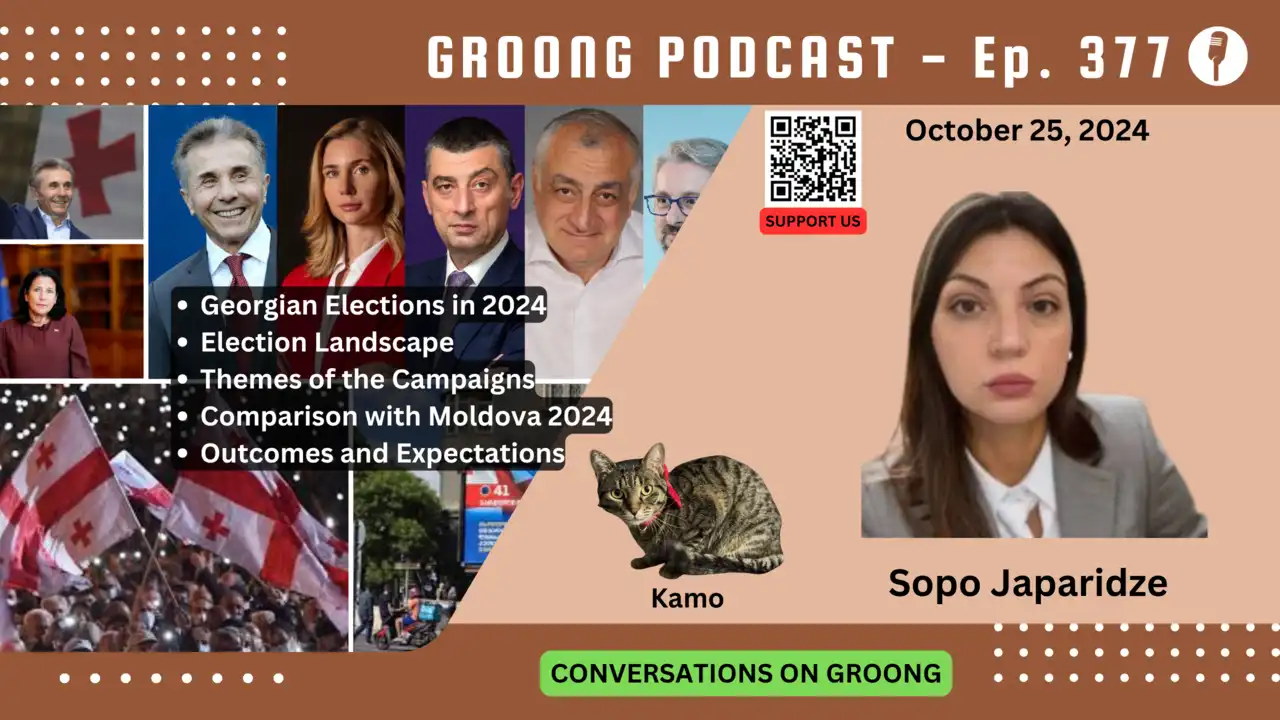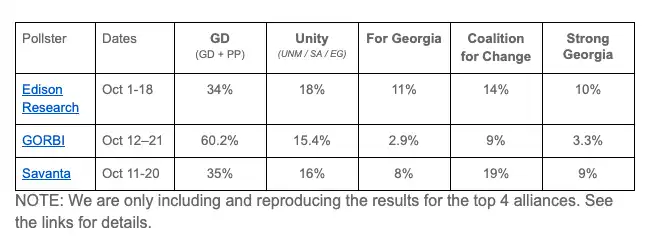
Groong Links:
Guest:
Topics:
- Georgian Elections in 2024
- Election Landscape
- Themes of the Campaigns
- Comparison with Moldova 2024
- Outcomes and Expectations
Episode 377 | Recorded: October 23, 2024
Show Notes
Introduction
Hello, and welcome to this Conversations on Groong episode.
First off as always, thanks to our listeners for your valuable and often insightful comments. Keep them coming, and Like and Share our shows to your friends!
But we have another request today as well.
Hundreds of you listen to our shows through their podcast apps. If you listen to our show on Apple Podcasts, - for example on your iPhone, or iPad, or your Mac computers, please consider rating our show and leave a brief review! We have 18 reviews and we’d love to get dozens more. That will help us become more visible, and we’re always interested in reaching a wider audience.
Today we’re talking about the upcoming 2024 Parliamentary elections in Georgia. These elections are set to take place on October 26 in just 3 days. The country is at a crossroads, caught between its modern efforts to join Europe and trying to remain grounded in the geopolitical realities of the region. For the political forces taking part, the stakes have never been higher. We’ll be diving deep into the dynamics of the election campaigns, key players, and the broader context of Georgia’s growing tensions with its Western partners.
To help us unpack all of this, we have with us Sopo Japaridze, who has been closely following and covering these developments. Welcome back, Sopo!
Georgian Elections in 2024
To set the stage, we should mention that Sopo has been following the 2024 Georgian parliamentary elections closely through her own ongoing coverage on her Substack. We’re putting a link to her very interesting Substack page in our show notes, so please go there and click your way through to her work.
In a detailed six-part series, she and her guests have provided valuable insights into the key issues shaping this election, from political party dynamics to foreign influences and public sentiment. Her series, which starts with an overview of the election landscape and progresses through the campaigning strategies and media narratives, is an excellent resource for anyone looking to understand what’s at stake for Georgia. Again you can check out her work on Substack.com/@sopio, starting with her comprehensive election guide in Episode 1.
In our previous episodes on Groong, we’ve also explored many of these themes, including Georgia’s complex relationship with the West, the role of Russia, and the country’s evolving domestic politics. You can find those under Content -> Categories -> Georgia on our website.
Today, we’ll continue that conversation.
Questions:
- Sopo, could you start by giving us a high-level summary of where things stand today, 3 days before Election Day?
Current Election Landscape
In our previous discussions with our Georgian guests we have discussed election poll results, such as Gobi, Edison Research, etc.
Let’s take a quick look at the polls, which vary significantly based on the pollster, despite being carried out in the same time frame.
Polls considered:

Questions:
- We’ve frequently heard that polls in Georgia are politicized? What’s your take? Do you think any of these polls provide valuable insight into popular sentiment, one way or another? And also, how did they change over time?
- Is a high voter turnout expected, and whom does that benefit more?
- Which of the major political alliances are most likely to form coalitions with each other? (without going into too much details)
Campaigning Overview
Let’s talk about the campaign process a bit.
Questions:
- How have the campaigns unfolded? Can you summarize this for us?
- What were the key challenges for candidates and political parties?
Themes of the Campaign
The key line of political demarcation in this election, or should we say geopolitical demarcation is the level of Georgia’s commitment to the EU/NATO.
- In Western media, the narrative is framed as “if GD wins, then Russia wins” and Georgia will pivot towards Russia.
- Meanwhile, voices grounded in realpolitik have a more nuanced definition. That GD’s policies simply seek good relations with all its neighbors, or more precisely avoid enmity with major powers such as Russia, China and Iran.
This has overshadowed many other issues and divisions in Georgian society; for example liberal vs. conservative values, earlier this year we saw attacks on the Georgian Orthodox Church, etc.
Questions:
- What are the key national, and social values that are on the line during these elections?
Several days ago, Ivanishvili made a bombshell revelation on Georgian TV. He claimed that a western official had suggested that Georgia open a “second front” against Russia in the current war. We’ve frequently been hearing Ukrainian media as well that Georgia should open a second front.
Questions:
- Can you tell us the details of how this happened and the significance of this announcement/revelation?
Media Coverage
Western media, which supports the opposition, has given heavy emphasis to covering the anti-government protests in Tbilisi, LGBT rights and legislation that affect these communities.
Meanwhile, the media supporting the incumbent GD talks about apartment laws, confederation with Abkhazia and South Ossetia, and so on.
Questions:
- What’s your take on the talk about Georgian confederation with Abkhazia and South Ossetia, do you think these are red herring issues dangled to tilt the Georgian elections towards Russia?
Comparison with Moldova
Moldova held elections over this past weekend. The OSCE qualified it a “well managed and competitive” election. So far it looks like a bare majority of 50.39% voted to seek membership in the EU.
Questions:
- How does the outcome in Moldova impact on Georgia?
- Are there parallels between the Moldovan and Georgian election dynamics?
Election Forecast & What Comes Next
Almost everyone we’ve talked to expects unrest, and potential violence after the election, because they say no matter what happens, the other side is poised to reject the results and take to the streets.
Questions:
- What do you expect on Election day, and its aftermath? What potential scenarios do you foresee in post-election developments?
- (I’m sure we’ll touch base in the days or weeks after the results are well known)
Regional Implications
Questions:
- What could the election results mean for Armenia, Azerbaijan, and the region as a whole?
- How might shifts in Georgia’s political landscape affect its relationships with its neighbors?
Wrap-up
All right, that’s our show, we hope you found it useful. Please find us on Social Media and follow us everywhere you get your Armenian news, the links are in the show notes.
Thanks to Laura Osborn for the music on our podcasts. We’ll talk to you soon!
Guests

Sopo Japaridze
Sopo Japaridze is the chair of Solidarity Network, an independent care workers union in Georgia. She has been a labor organizer for over a decade. She researches and studies labor and social relations and writes for various publications. She is cofounder of the Reimagining Soviet Georgia podcast.
Hosts

Hovik Manucharyan
Hovik Manucharyan is an information security engineer who moved from Seattle to Armenia in 2022. He co-founded the ANN/Groong podcast in 2020 and has been a contributor to Groong News since the late 1990s.
Disclaimer: The views expressed by Hovik Manucharyan on the ANN/Groong podcast are his own and do not necessarily reflect the opinions of his employer or any other organization.

Asbed Bedrossian
Asbed Bedrossian is an IT professional, and for years oversaw the central IT enterprise infrastructure and services at USC. His decades of experience spanned across IT strategy, enterprise architecture, infrastructure, cybersecurity, enterprise applications, data center operations, high performance computing, ITSM, ITPM, and more.
Asbed founded the Armenian News Network Groong circa 1989/1990, and co-founded the ANN/Groong podcast in 2020.